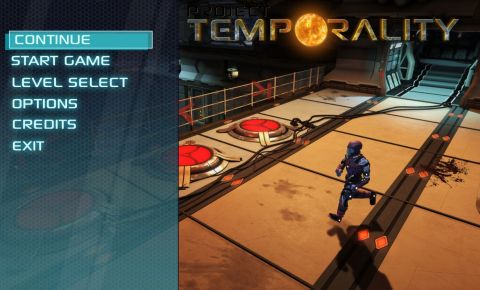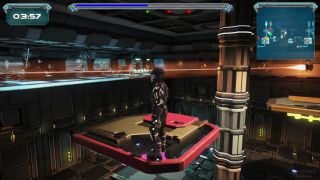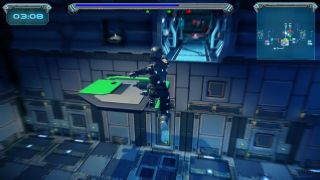A lot of gamers will take a quick look at Project Temporality and categorize it as a clone of the very successful Portal franchise, which replaces the portal mechanics with clones based on time travel and tries to match the level of humor associated with the Valve-created series.
But the game made and published by Defrost Games is not just a copy but an original take on the genre, a puzzle platformer that takes the idea of time, quickly and seamlessly creates gameplay around it and then asks the player to complete a variety of challenges, while exploring the implications of the technology that he wields.
Project Temporality creates a solid setup for its gameplay without using too many narrative elements and manages to make the player constantly curious, eager to get access to more information about the location and the wider story.
The protagonist is called Subject 87 and he seems to be just one in a long line of humans who are testing an implant which allows them to control time and perform some nifty little tricks.
Project Temporality tells its interesting but limited storyline via documents littered around the levels and it manages to create an atmosphere that’s very similar to that of the second System Shock title, even if the writing is not as subtle.
Still, developer Defrost Games does manage to offer some interesting insights into the implications of time manipulation and it’s nice to see characters react in very different ways to the progress of the testing process.The core gameplay of the title is often called time travel, but it could be more accurately referred to as timeline duplication and manipulation.
The player has the option to stop the forward flow of seconds and minutes at any point and rewind to any point he wants to, while also creating a temporal clone of himself that will go on and perform the actions that he executed from that point on.
Basically, gamers can use multiple versions of themselves in order to stand on buttons, push levers, stop lasers and deal with shielded objects, which in turn opens a number of doors that stop progress towards the end of each level.
The time manipulation mechanics are easy to learn from a mechanical point of view, but our brains are so well calibrated to deal with the forward flow of time and its irreversible nature that it takes a while to understand how to actually use them.
The developers start the player off with some simple puzzles, but even those can feel impossible to figure out at times.
The complexity ramps up as Project Temporality progresses and they can sometimes feel frustrating, which is why I tended to only engage with the title in 2- to 3-hour-long sessions.
The draw of learning more about the game world and the fact that the mechanics are simple kept drawing me back to the game despite the moment when I was prepared to quit for good.
The best way to approach a puzzle is to run around, activate what platforms and other elements you can and see where they go and how, while building a mental checklist of how time manipulation can be used to avoid obstacles and open up the required doors.
Once a primary plan is formed, I tend to execute all the core moves, create the clones and run through the scenario, tweaking it as I go along to make sure that it fully works before rewinding once more to the start in order to eliminate all other small glitches and aim for the best possible time.
Project Temporality also looks very good considering its indie roots, which is achieved in part by limiting the gameplay area to a series of rooms and by recycling a lot of the textures and the surrounding areas.
The main character does have a weird way of running around the station, but the game has a cool style, a mix of the old Deus Ex and Dead Space, and the environments and the interface are well designed to let the player know how he needs to proceed through levels.
The minimap is very well designed and as the game progresses, it becomes crucial, especially for those who are aiming to get all the performance stars for each stage.
The game features no voice acting, but the written dialogue is sufficiently captivating to keep players moving through the game.
Project Temporality is clearly an indie game that lacks the resources to deliver the same level of spectacle as Portal from Valve, but Defrost Games has managed to create a core gameplay mechanic, timeline duplication and manipulation, that is as compelling as the use of the portal gun.
The title offers quite a bit of fun for those who love the idea of solving puzzles, while philosophically questioning the role that time plays in our lives.
 14 DAY TRIAL //
14 DAY TRIAL // 















